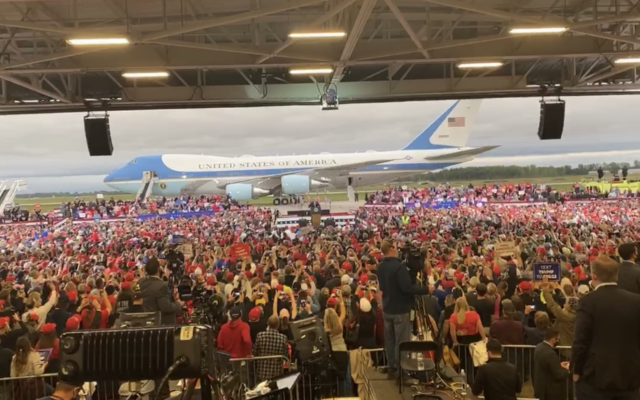McAuliffe embraces Biden in bid for second term as Virginia governor

Inside the Champion Brewing Company in Charlottesville, Virginia, Terry McAuliffe, the former Virginia governor who’s running for his old job, was talking to owner Hunter Smith last week when a staffer handed him a mask for “continuity” with everyone else.
“The president says don’t wear masks inside,” McAuliffe parried before putting on the mask. “I don’t like to argue with Joe Biden.”
As he tries to reclaim the governor’s seat, too, McAuliffe, a longtime Democrat, is also sticking close to the president’s campaign approach, hoping to replicate his 2020 success when Mr. Biden won Virginia by double digits in both the primary and general elections.
How McAuliffe fares in the June 8 primary, among a slate of progressive and diverse candidates, could give the party a window into the appeal of moderate candidates ahead of the 2022 midterm elections.
But McAuliffe has a strong head start on the rest of the field, since he’s had the job before and has held a substantial lead in public polls. The last one, in late April by Christopher Newport University, showed him with 47%, while all the other candidates were in the mid-single digits. McAuliffe was governor from 2014 to 2018 but couldn’t run for a consecutive term because state law prohibits it. Now he’s reintroducing himself to voters as an experienced figure to lead the state’s pandemic recovery. A Virginia governor hasn’t served more than one term since 1978.
His campaign is counting on an electorate that’s similar to the one that voted for Mr. Biden, composed of White moderates and older Black voters.
“In Virginia, whoever wins the White House, the other party wins the governor’s mansion. I’m the only guy to break that in a 44-year history of this state,” he told CBS News, alluding to his 2013 victory after President Obama won his second term. “Why? Because I have big, bold plans.”
When asked about Republicans in the state, McAuliffe brought up his work with Democrats in beating Mr. Trump “like a drum,” a simile Mr. Biden also frequently used.
But as was the case for Mr. Biden’s primary campaign, McAuliffe’s field is a crowded one: Former state Delegate Jennifer Carroll Foy, Delegate Lee Carter, state Senator Jennifer McClellan and Lieutenant Governor Justin Fairfax.
Carroll Foy and McClellan are just behind McAuliffe in ads and last-minute campaign activity. While their ideological pitches to voters differ, they both argue a new figure is needed in order to drive turnout in November, and that it should be a Black woman.
Carroll Foy is second in fundraising after McAuliffe, and she’s been the only other candidate to air ads consistently in Virginia’s major media markets.
According to Medium Buying, McAuliffe has spent $3.28 million on radio and T.V. ads during the race, compared to $1.33 million spent by Carroll Foy and $108,000 by McClellan.
Carroll Foy seeks to portray herself as the most viable progressive option, an argument she has been making against McAuliffe in debates and on the trail. During a campaign stop at a Black church in southeastern Virginia, she turned his “big, bold” keywords against him.
“Politicians of the past have come through during the campaign season with all of these big, bold promises. But when we needed them, they turned their backs on us,” she told the congregation.
“Virginians just aren’t excited right now to elect another multi-millionaire out of touch politician, because the broken politics of the past and status quo has left so many Virginians behind,” she told CBS News, pointing to an increase in the racial wealth and poverty gap.
“We have a Republican opponent who can self-fund his campaign,” she said of the GOP nominee Glenn Youngkin, a former CEO of the investment firm The Carlyle Group that was backed by former President Donald Trump. “That’s why we have to have an inspiring candidate at the top of the Democratic ticket who’s going to get our base out.”
Youngkin’s campaign has been pointing to his latest internal numbers to argue a McAuliffe candidacy won’t turn out Democratic voters in November. They show a potentially tighter general election race between him and McAuliffe, a margin of three to five points, compared to a different candidate.
But McAuliffe and Youngkin have already been trading barbs on Twitter, and Youngkin’s first ad of the general election assumes he’ll be running against the former governor.
“What we need isn’t another politician — or worse, the same politician,” Youngkin says.
McAuliffe argues the prospect of working with a Democratic general assembly, which he never had during his tenure, will excite voters for his second run.
“With a Democrat legislature, I can fix all the things that we have been wanting to fix for a long time,” he said.
But while talking to some diners at a soul food restaurant in Franklin, Virginia, Carroll Foy found not just a lack of enthusiasm, but an unawareness that a primary was going on.
“I am worried about people not coming out to vote because we have a real president now,” Democrat Delegate Candi King, who succeeded Carroll Foy in her state district, told CBS News after an event with McClellan. King has not endorsed any candidate.
“We don’t have the person in the White House really energizing folks to come out and have their voices be heard.”
University of Mary Washington political science professor Stephen Farnsworth notes gubernatorial Democratic primaries, while open to any voter since Virginia doesn’t register voters by party, are usually low turnout affairs.
In the 2017 primary between current Governor Ralph Northam and former Charlottesville Congressman Tom Perriello, 542,816 voters turned out. By comparison, 2,614,065 voters turned out for the general election.
The question of who the Democratic nominee is “matters less than whether the eventual Democratic nominee wins in November,” said Farnsworth, adding this trend benefits a more establishment candidate like McAuliffe.
“A moderate candidate is going to be favored in statewide elections, even among truly committed Democrats, because of the concern that many of them have over the possibility of a loss in November,” he said. “Even though Virginia Democrats have won a lot of elections lately, all indications are that the many defeats in the past are still readily accessible memories.”
McClellan, who has taken a different approach from Carroll Foy and has been hesitant to lob attacks at McAuliffe, dismissed the polls.
“I don’t pay attention to polls that talk to six hundred to eight hundred people. I’ve talked to hundreds of thousands of people. And the reception that we are getting — I’m going to win,” she told CBS News after a round table in northern Virginia, adding that McAuliffe’s policy platforms “build on my work.”
McClellan’s pitch is one based on her experience — she has served 16 years in the legislature — and on history.
“There’s no playbook for a Black woman governor,” McClellan said. “I’ve had to create the playbook a little bit. COVID was certainly a challenge. But Black women are used to doing things that people don’t expect us to do.”
Quentin James, founder of the Collective PAC, which supports Black candidates and has backed both Carroll Foy and McClellan, called their candidacies to become the nation’s first Black woman governor “a good problem to have, but nonetheless, still a problem.”
He said he’s seen support split between the two and thinks that there was a missed opportunity to turn the primary into a two-person race.
“The idea that Terry McAuliffe should not have run because a Black woman stepped up to run — while I might personally agree with it — from a political calculation, you’ve got to beat Terry McAuliffe. It doesn’t matter what the White candidate does,” James said.
When asked about whether Virginia and the party would benefit from a new politician, McAuliffe touted his support from members of the Black caucus who asked him to run.
McAuliffe, who has long been one of his party’s most tireless fundraisers, was the top PAC donor to Virginia’s Democratic party in its successful effort to flip the legislative chamber in 2019, and was a notable early endorser and campaigner for for Mr. Biden in 2020.
“Some candidates are calling for a revolution. Well you know what? We had a revolution 244 years ago. It ended 30 miles from here,” McAuliffe said in March 2020 at an event with Biden in Norfolk. “We don’t need a revolution, we need Joe Biden in the White House!”
The Democratic candidates will have their final debate Tuesday night, a week before the primary.



